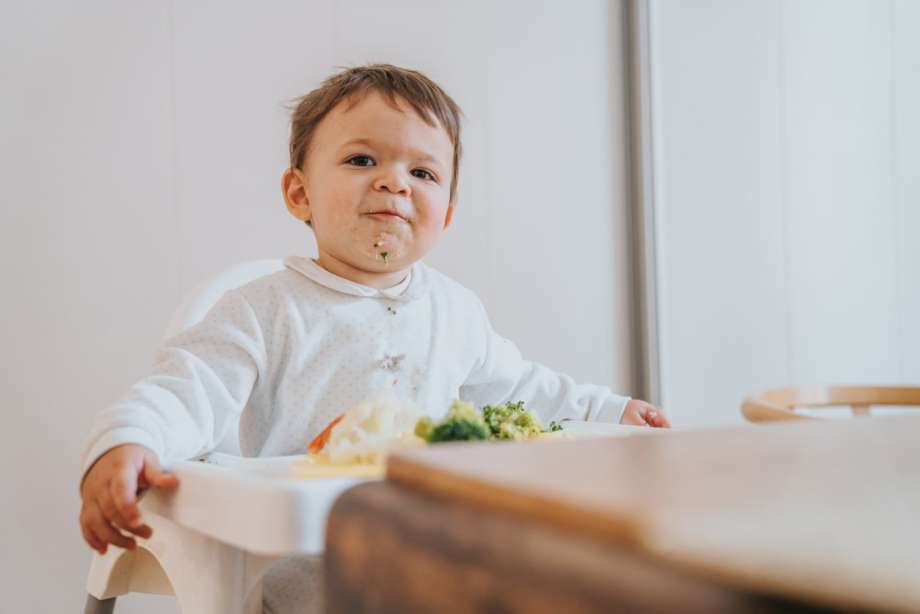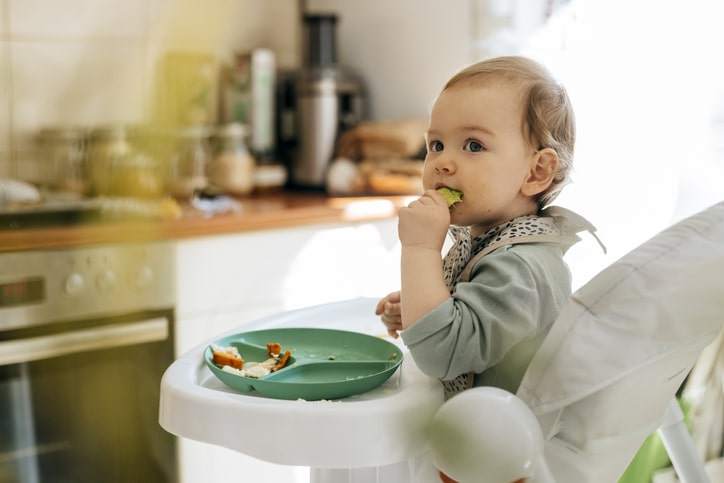Foods to Never Feed Baby Before 1-Year-Old

The American Academy of Pediatrics recommends providing only breastmilk or formula until around 6 months of age. According to the CDC, you can start introducing solid foods to your baby at around 6 months old. Talk to your pediatrician about if your baby is ready to try solids and what to introduce to your baby first.
Growing babies soon start to show interest in trying new foods, and it's normal to want to introduce them to new tastes and textures. But giving some foods to baby may not be safe, and preventing exposure to other foods may not be best for your baby either.
A newborn infant's gut is very immature, but as it develops, additional foods can be added to help provide a well-balanced diet with a variety of tastes and textures.
Related: A Parent's Guide to Choosing the Best Baby Food Makers
Baby Food Safety (6 Months and Older)
Babies are typically introduced to solid foods around six months of age. Newborns and babies less than six months old may not have the ability to use their tongue to remove foods, which may pose a choking hazard. Here are tips for what foods to try and what foods to avoid once baby is around six months old or older!
Pureed Foods vs. Finger Foods
When babies demonstrate readiness for introducing new foods, many parents will turn to baby pureed foods or fortified infant cereals. Pureed foods are softer than finger foods and easier on a baby’s digestive system. However, some parents turn to baby-led weaning which can also be a great option to introduce your little one to solid foods.
Risk of Highly Allergenic Foods
It is not recommended to wait a prolonged period of time before introducing foods that are common allergens, as this may increase the likelihood of developing an allergy. Instead, discuss with your pediatrician the risk factors for allergies prior to introducing these foods, and notify your provider if any allergy or intolerance has occurred.
A few single-ingredient foods that are low-risk allergies should be introduced to your babies first. It is recommended to wait 2-3 days before introducing the next food to monitor for allergy, intolerance or reactions. Additional considerations are needed for eggs, dairy, and peanut products:
Eggs
Eggs should be well cooked and only a small amount should be provided to the newborn and observed for any reaction or intolerance.
Dairy
A child under the age of one can't digest the enzymes and proteins in cow's milk, and certain minerals in it can cause damage to your baby's kidneys. So wait to provide cow’s milk for one year. However, dairy products (such as yogurt) may be provided to the newborn.
Peanuts/Peanut Butter/Nut Products

The AAP recommends talking with your pediatrician about introducing nut products to your baby, once they are tolerating solid foods. Peanut products should not be the first highly allergenic food provided to the baby. Your provider will likely recommend an allergy test prior to introducing peanut products if there is a higher risk of a peanut allergy (because of family history, an existing food allergy, or eczema).
Discuss with your provider if an allergy test is needed prior to introducing peanut products, or if it should be introduced while in the provider’s office. Peanut butter and other nut butters are a choking hazard and should be thinned and/or mixed in with food that has already been tolerated by the baby (such as yogurt).
Note: Peanuts themselves should not be provided to children under the age of 4, as they are a choking hazard.
Can Babies Eat Fruit Before One-Year-Old?
Fruits are a great source of vitamins and nutrients. Generally, fruits can be cut into small pieces and provided at the time that finger foods are introduced (when the pincer grasp is developed). Pureeing fruit is also an option. However, there are some safety precautions to take when introducing fruit to your baby:
Strawberries and raspberries
Many berries are packed with vitamin C and are good for babies and young children. The American Academy of Pediatrics that These can be provided when other finger foods are introduced. Be mindful of the shape of the fruit as well, and consider cutting it into tiny pieces to avoid choking.
Pureeing these is also an option. However, berries are often high in pesticide residue. To avoid this, consider buying organic, or rinse or boil the fruit first. Boiling also helps to soften its texture.
Pineapple
Pineapple is considered a safe food for your baby to eat. However, it is a firm fruit that may be difficult and should be sliced into thin strips since it can be a choking hazard when cubed.
Jams and Jellies
Jam and Jellies are ok for a baby to eat. However, be mindful when selecting any jams or jellies, as the American Academy of Pediatrics does not recommend food with added sugars.
Why You Should Avoid Feeding Babies Citrus Fruits
Citrus fruits such as lemons, limes, and grapefruits are not recommended for babies until around 8-10 months. These foods are acidic, which can cause an upset tummy and/or acid reflux, or diaper rash.
For hand-held citrus fruits like oranges and tangerines, parents should wait until their baby develops more fine motor skills. When baby can demonstrate the pincer reflex — usually around 8-10 months — these foods are safer to eat.
Can Babies Eat Vegetables Before One-Year-Old?

Vegetables are healthy options for kids, but when is the right age for babies to start eating their veggies? Here is a list of veggies and produce that parents have questions about. You can find below whether or not they are safe to give to your baby.
Spinach (cooked)
Believe it or not, raw spinach is full of nitrates. This is not to be confused with synthetic nitrates but is still not good to give much to little ones. It is recommended that if you give them spinach, make sure it is cooked and pureed.
Lettuce
Be sure your child has mastered chewing because lettuce can be tricky to chew. Also review serving sizes for foods like lettuce and cabbage.
Onions
Onions are not always pleasant to eat raw. However, many parents add cooked onions to homemade baby food. They are full of vitamin C and can be introduced between 6 and 8 months old.
Potatoes (small amounts)
Potatoes are considered starchy vegetables so even though they are safe to give to your baby, you will want to do it in moderation.
Foods to Avoid Feeding Babies Until 1 Year of Age
Some foods are not considered safe for babies until they’re at least one year old due to their developing immune systems or difficulty chewing or swallowing certain textures. Here are some foods you shouldn’t introduce to your baby till past the one-year milestone.
Honey
Infants under one year old should not be fed any form of honey (raw, baked, or cooked). Honey is bad for babies because it can harbor Clostridium botulinum, which can produce botulinum spores.
An infant's intestinal tract isn't fully developed or strong enough to fight off these spores and toxins. These spores secrete toxins that can lead to muscle weakness, poor sucking, a weak cry, constipation, decreased muscle tone, and even paralysis in young infants.
Infant botulism can be prevented by avoiding raw honey and avoiding contact with soil contaminated with the same C botulinum spores. This is rare and mostly found at agricultural sites in Utah, California, or Pennsylvania.
Large Chunks of Food
Once you start baby on solids, pea-sized foods are safest, to prevent choking. Make sure that vegetables are diced and cooked up soft, and cut fruits into quarters to avoid them getting stuck in your child's throat. Meats and cheese should also be cut into very small pieces or shredded for the first year.
Your child should be able to eat larger pieces of food after practice with chewing, typically around 1 year of age. However, be sure to cut up foods that are in the shape of the child’s airway, such as grapes, cherry tomatoes, hot dogs, etc.
Difficult to Chew Foods
While food like lettuce and cabbage do not require molars to bite into smaller pieces, it is difficult to chew which may lead to choking. Because of this, these foods should be avoided until the age of one.
Fruit Juice (diluted/small amounts)
Most juices are full of added sugar. Additionally, fruit juices cause a spike in blood sugar, since the fiber that slows this process has been removed. Since babies are generally still drinking from bottles under 1 year old, it is not advisable to put fruit juice in them.
Most grocery stores’ fruit juices can contribute to tooth decay. If you choose to provide fruit juice to your child, you should wait until 1 year old and offer no more than 4 ounces of 100% fruit juice per day.
You may consider diluting the juice as well. If you wish to offer something besides breast milk or infant formula you can begin providing small amounts of water in a Sippy cup.
Foods to Avoid Giving Kids Under Four-Years-Old
Introducing meat to your baby's diet can happen after starting solids, which is usually around 6 months. These should be pureed until demonstrating the ability the chew and eat finger foods. Poultry and lean beef are fine to give your little one in small amounts. Below are two types of meat that should be avoided.
Hotdogs

Hotdogs are a choking hazard. It is not recommended to give them to young children under 4 years of age. When they are old enough, they should be cut lengthwise so it is no longer round, and thinly sliced or minced.
Bacon and Processed Meats
Bacon is generally considered unhealthy and should be offered rarely, at most. It is full of synthetic nitrates and possible carcinogens. If provided, it is best to wait until after your baby's first birthday and into toddlerhood to give them any bacon.
Foods That Require Molars for Chewing
Wait until your child is 4 years old for foods like whole nuts, popcorn, whole grapes, raw vegetables, marshmallows, jelly beans, raisins, hard candies, dried fruits, seeds, or any other small hard food. Molars are required to chew the food into safe-sized pieces. Until then, they are all choking hazards and can easily become lodged in your baby's throat. Any food you give your baby should be diced into small bits and cooked until soft.
As your baby grows older, they’ll expand their palates and develop new favorite foods and flavors. To keep your baby safe while feeding, make sure to follow these baby food safety guidelines and avoid rushing to give baby any food they’re too young for.

